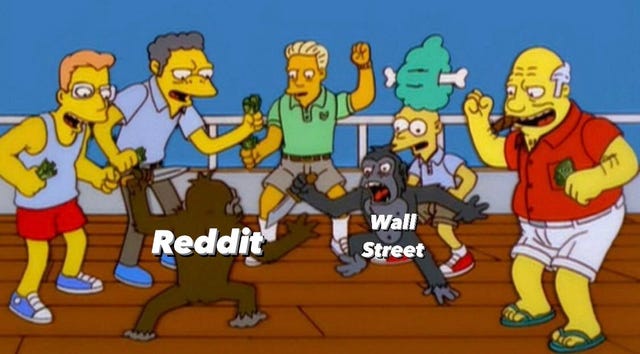RobinHood, Reddit, Retail Investors, and the Role of Regulation

In the course of a week, the share price of GameStop increased by almost 1000%, from $39 per share to around $350 at its peak. The gaming retailer did not suddenly and dramatically change its business model, nor did prospects for the chain of brick-and-mortar stores markedly improve. The run appears to be driven almost entirely by a community of investors who found each other through the Reddit page, /r/WallStreetBets (“WSB”). The WSB community seized on GameStop as an attractive target for putting what is called a short squeeze on major hedge funds that were openly pessimistic about the company’s prospects. In that sense, it pitted major financial institutions against a committed group of social media users. The short squeeze is being billed as a populist uprising, a parallel of the political movement that propelled Donald Trump to the White House, this time played out on the New York Stock Exchange. At first blush, it tells an appealing narrative, the collective underdogs are taking on the giants of Wall Street and making millions. But, as the squeeze begins to unravel, it prompts questions as to who the real winners and losers will be, and what role, if any, regulators should play in these types of situations moving forward.
WallStreetBets
Reddit bills itself as “a network of communities based on people’s interests.” It calls users to find communities they’re interested in, and become a part of them. /r/WallStreetBets is one of those communities. The founder of the group, Jaime Rogozinski, described it as “catering to those with a “YOLO” attitude who approached trading as they might with gambling.” It was meant to be a place where retail investors, those not part of major financial institutions, could come to share stories, discuss wins, and commiserate over losses. It was never meant to be used to coordinate a potentially market-destabilizing event such as the GameStop squeeze, and Rogozinski has compared the direction WallStreetBets has taken to “watching a train wreck.”
The GameStop frenzy has been attributed to one Reddit user, using the handle “RoaringKitty,” and his $53,000 bet on the company in 2019. Inspired by his Reddit posts, TikToks, and YouTube videos about his investment, other uses began to pile in. Though far from professional investment analysts themselves, Redditors poured over the company’s financials, discussing the investment at length in comments sections of Roaring Kitty’s videos, and on the /r/WallStreetBets subreddit. Like the inexplicable virality of one meme over another, this particular investment gathered momentum as more and more bought in—both literally to the stock—and figuratively to the David and Goliath narrative that was equally on sale. It was too good of a chance to pass up, to make money, all at the expense of Wall Street’s hedge funds who had taken the other end of the bet. The move has captured the attention of the country in the past week for some of the same reasons it gained traction in the corners of the internet, it was, at first, equal parts inspiring, amusing, and justice-enhancing.
The Short Squeeze
The success of the /r/WallStreetBets coordinated buying is in large part due to the nature of the position that the hedge funds had taken on the company. It is worth a short explanation of short positions and options trading. Roaring Kitty and his army of Redditors chose GameStop in part because they noticed large players in the market had taken short positions on the company. In order to short a stock, one sells a borrowed share of the company, and closes out the position by buying a share to return to the lender in the future. A shorter profits when the share price falls over that period of time. They are able to sell high, and then buy low, and keep the difference. The danger in a short position is that the potential downside risk is theoretically limitless. If a shorter sells a share, and then the price continues to rise, there is no end to how unprofitable the trade could end up being when the shorter must inevitably buy a share to return to their lender, thereby “closing out” their short position. This naturally makes investors nervous, and so there is pressure to hedge the risk of a short position by buying shares of the underlying stock early. Now, the problem is exacerbated by more buy-side pressure. Not only are Roaring Kitty’s armies of Redditors bidding up the share price, the very hedge funds that are short the stock are buying up shares to cover their position. This feedback loop, increased buying creates increased pressure to hedge risk, which creates increased buying which increases pressure, is what is referred to as a short squeeze.
SEC Regulations
While some cheer the success of David over the Wall Street Goliaths, others, including Senator Elizabeth Warren, are concerned. The fear is that, should forces like WSB go unchecked, it could undermine the public’s confidence in the stock market more broadly. Essential to the success of the markets is the notion that they are efficient, they reflect the allocation of capital to the most productive uses. Dramatic swings in share price, untethered from any rigorous economic analysis, and motivated by internet mob mentality, destroys this notion. The common refrain – this is gambling, not investing, needs no more evidence than the subreddit’s name itself: /r/WallStreetBets. The SEC has responded that it is “aware of and actively monitoring” the market volatility to determine if there has been illegal market manipulation. In other words, did the enthusiasm expressed on WSB get to such a point that readers were manipulated into purchasing the stock? It is a difficult case to make, and one that shows the SEC is not equipped with the enforcement chops to handle this type of situation, another concern expressed by Senator Warren.
As the situation continues to unfold, however, the SEC may have more reason to become involved. After the unrelenting rally by GME and other stocks targeted by WallStreetBets, online brokerages like Robinhood called a stop to buying activity. The application has cited capital requirements and its own obligations to clearinghouses to cover this huge increase in trading volume, but others have cried foul. The brokerage’s move has been seen as evidence of the stock markets being institutionally rigged against retail investors, and has prompted the SEC to comment that it will “act to protect retail investors when the facts demonstrate abusive or manipulative trading activity that is prohibited by the federal securities laws.” There is mounting pressure on the SEC, from both sides, to get involved. Just what they are able to do about it is exactly Senator Warren’s question. What they should be able to do is a broader question that will likely be debated as this situation continues to unfold.
On the one hand, traditional financial institutions are making the case that retail investors are threatening the efficient functioning of the markets with their wild bets. The argument continues, if this activity grows, and hedge funds are forced to sell off shares in other stocks to cover their now incredibly unprofitable short positions, there may be undesirable downward pressure on the market more broadly. Taken to an extreme, this could cause a “sell-off” that threatens to burst a securities market that may be at the end of a bullish run anyways.
On the other hand, retail investors argue that hedge funds calling for the SEC to step in to punish “market manipulation” is the worst form of the pot calling the kettle black. A short squeeze is not a novel concept, nor are activist hedge fund managers immune from engaging in trading that seems personally motivated at times. Further, Robinhood and other e-trading brokerages halted very targeted types of trades. They halted buying, not selling, on four stocks, including GameStop. If exhorting Redditors to buy shares of GameStop might rise to the level of manipulating the market, it is hard to see how preventing traders from making certain types of trades does not as well.
All this will prompt a debate on the proper role of the SEC in market regulation. The outcome of that debate may turn on the perceived winners and losers of the GameStop short squeeze. Given the political climate, there may be bipartisan support for limited enforcement capabilities at the SEC if the winners turn out to be the subredditors on /r/WallStreetBets. It’s been billed as a populist uprising akin to the swell of support for political-outsider Donald Trump on the right, and has garnered support from leaders on the left such as Bernie Sanders and Alexandria Ocasio-Cortez, arguing this is righting the wrongs of an uneven playing field. How does the desire for increased enforcement change, however, when the squeeze unravels, and the big winners are not Roaring Kitty, but instead massive investment firms like BlackRock? It may be satisfying to watch the hedge funds shorting GameStop hurting, but does that satisfaction disappear when it is just a different Wall Street giant that benefits? BlackRock’s stake in GameStop has gone from $174 million to $3.1 billion. That is not a story of David beating Goliath. So, if it winds up that the retail investors on Robinhood are among the ones who are left holding the bag, then where do we go from here?
